
Aegean Macedonia is a term describing the region of Macedonia in Northern Greece. It is currently mainly used in the Republic of North Macedonia, including in the irredentist context of a United Macedonia. The term is also used in Bulgaria as the more common synonym for Greek Macedonia, without the connotations it has in the Republic of North Macedonia. The term has no circulation in Greece, since Aegean usually refers to the Greek islands or to strictly Greek coastal areas with direct access to the Aegean Sea. Although Greek Macedonia does have its coastline along the northern Aegean, the province is more than anything else dominated by its high mountain ranges and broad, grassy plains, rather than by its coastline.

Koçi Xoxe was an Albanian politician who served as Deputy Prime Minister and Minister of the Interior of the People's Socialist Republic of Albania. He was supported by Yugoslav leader Josip Broz Tito during efforts to bring Albania into the Yugoslav federation. After Albania's leader, Enver Hoxha, established the country's independence with the support of the Soviet Union, Xoxe was arrested, tortured and executed.
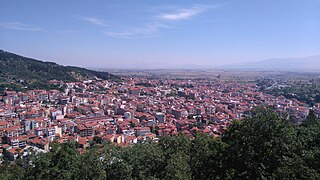
Florina is a town and municipality in the mountainous northwestern Macedonia, Greece. Its motto is, 'Where Greece begins'.

The military history of Greece during World War II began on 28 October 1940, when the Italian Army invaded Greece from Albania, beginning the Greco-Italian War. The Greek Army temporarily halted the invasion and pushed the Italians back into Albania. The Greek successes forced Nazi Germany to intervene. The Germans invaded Greece and Yugoslavia on 6 April 1941, and overran both countries within a month, despite British aid to Greece in the form of an expeditionary corps. The conquest of Greece was completed in May with the capture of Crete from the air, although the Fallschirmjäger suffered such extensive casualties in this operation that the Oberkommando der Wehrmacht abandoned large-scale airborne operations for the remainder of the war. The German diversion of resources in the Balkans is also considered by some historians to have delayed the launch of the invasion of the Soviet Union by a critical month, which proved disastrous when the German Army failed to take Moscow.

In the 19th century, the national revival in the Balkans began; national and religious antagonism flared, and conflict was heightened by the Ottoman policy of playing one group against the other. Meanwhile, the Ottoman Empire lost control over the major sections of Greece, Serbia, and Bulgaria, each of which claimed Macedonia on historical or ethnical grounds.
The National Liberation Front, also known as the People's Liberation Front, was a communist political and military organization created by the Slavic Macedonian minority in Greece. The organization operated from 1945–1949, most prominently in the Greek Civil War. As far as its ruling cadres were concerned its participation in the Greek Civil War was nationalist rather than communist, with the goal of secession from Greece.

Ohrana were armed collaborationist detachments organized by the former Internal Macedonian Revolutionary Organization (IMRO) structures, composed of Bulgarians in Nazi-occupied Greek Macedonia during World War II and led by officers of the Bulgarian Army. Bulgaria was interested in acquiring Thessalonica and Western Macedonia, under Italian and German occupation and hoped to sway the allegiance of the 80,000 Slavs who lived there at the time. The appearance of Greek partisans in those areas persuaded the Axis to allow the formation of these collaborationst detachments. However, during late 1944, when the Axis appeared to be losing the war, many Bulgarian Nazi collaborators, Ohrana members and VMRO regiment volunteers fled to the opposite camp by joining the newly founded communist SNOF. The organization managed to recruit initially 1,000 up to 3,000 armed men from the Slavophone community that lived in the western part of Greek Macedonia.
During and after the Greek Civil War of 1946–1949, members and or supporters of the defeated Communist forces fled Greece as political refugees. The collapse of the Democratic Army of Greece (DSE) and subsequent evacuation of the Communist Party of Greece (KKE) to Tashkent in 1949 led thousands of people to leave the country. It has been estimated that by 1949, over 100,000 people had left Greece for Yugoslavia and the Eastern Bloc, particularly the USSR and Czechoslovakia. These included tens of thousands of child refugees who had been forcefully evacuated by the KKE. The war wrought widespread devastation right across Greece and particularly in the regions of Macedonia and Epirus, causing many people to continue to leave the country even after it had ended.
Slavic speakers are a minority population in the northern Greek region of Macedonia, who are mostly concentrated in certain parts of the peripheries of West and Central Macedonia, adjacent to the territory of the state of North Macedonia. Their dialects are called today "Slavic" in Greece, while generally they are considered Macedonian. Some members have formed their own emigrant communities in neighbouring countries, as well as further abroad.

Georgios Tsontos also known with the nom de guerreKapetan Vardas, was a Greek guerrilla fighter, general, and later politician from Crete.
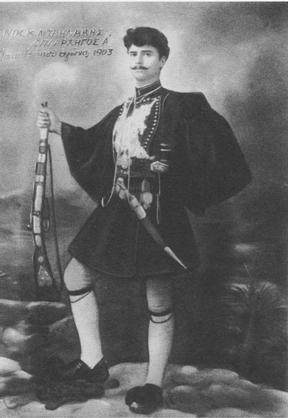
Nikolaos or Lakis Dailakis was a Greek revolutionary of the Greek Struggle for Macedonia.
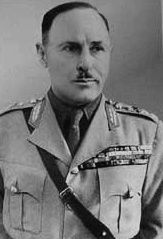
Konstantinos Ventiris was a Hellenic Army officer who rose to the rank of lieutenant general. He served twice as Chief of the Hellenic Army General Staff and was one of the senior government commanders during the Greek Civil War. He is also one of the few recipients the country's highest wartime decoration, the Commander's Cross of the Cross of Valour.

The Captain Kottas Museum or Museum of the Macedonian Struggle of Captain Kottas is located in the village of Kottas, Macedonia, Greece, the birthplace of the Greek Slavic-speaking Captain Kottas, one of the earliest protagonists of the Greek Struggle for Macedonia.
Lazaros or Lazos Tsamis was an Aromanian merchant who participated in the Macedonian Struggle and later as volunteer leader in the struggle for Northern Epirus in the side of Greece.
Andreas Tzimas, known also under his World War II-era nom de guerre of Vasilis Samariniotis, was a leading Greek Communist politician, best known as one of the leading triumvirate of the Greek People's Liberation Army during the Axis occupation of Greece. After the war, he fell into disfavour and died in obscurity in exile in Prague.
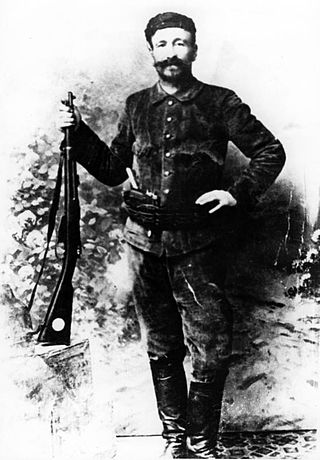
Efthymios Kaoudis was a Greek revolutionary and the leader of the first Cretan armed group in Macedonia, during the Macedonian Struggle.
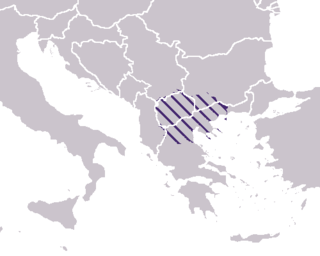
The 1867 Macedonian Rebellion was a Greek rebellion which aimed at resisting against the arbitrariness of the local Ottoman dynasts, asserting the rights of the Macedonian Greeks in the area, as well as indirect aiding the already ongoing Cretan Revolt.
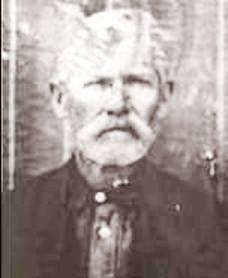
Traianos (Traikos) Liantzakis or Lantzakis was a Greek chieftain of the Greek Struggle for Macedonia.

Petar Traykov Girovski was a Bulgarian Army officer, later activist of the Internal Macedonian Revolutionary Organization. Afterwards he became close to some communist circles and after the Second World War participated in Yugoslav and Bulgarian politics.
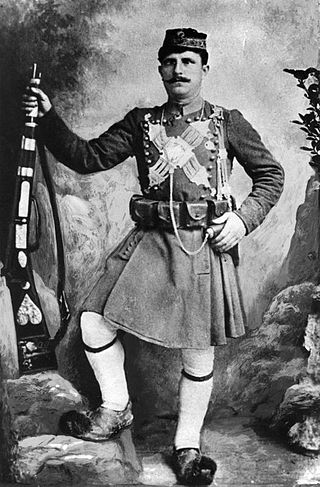
Dimitrios Kechagias or Konstantinidis, known under the pseudonym Dimitrios Dalipis, was a Slavophone Greek chieftain of the Macedonian Struggle.














